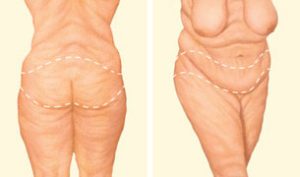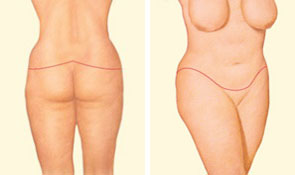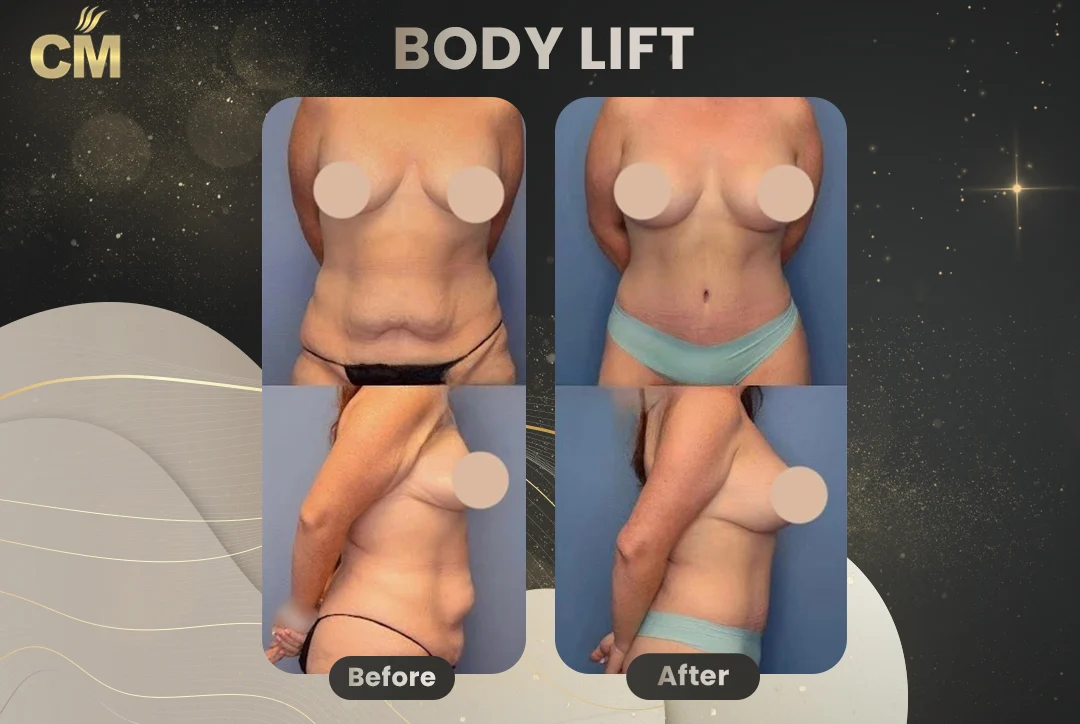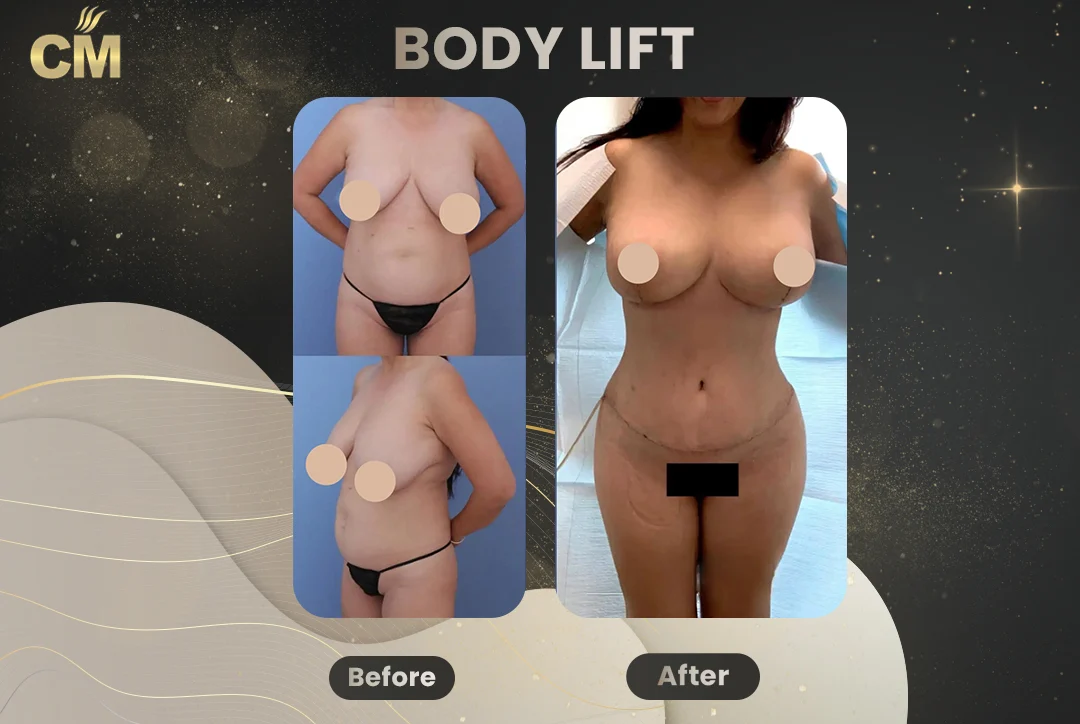Body Lift – Skin Removal Surgery
A body lift is a transformative cosmetic surgery designed to reshape and enhance the tone of underlying tissue that supports skin and fat. It eliminates excess sagging skin and fatty tissue, resulting in smoother, more youthful contours. For many individuals, particularly after massive weight loss or aging, the dramatic change seen in body lift before and after images marks a turning point in their confidence and quality of life. This procedure is commonly referred to as a form of skin removal surgery, especially after significant weight loss.
Areas Commonly Treated with a Body Lift
- Abdomen – including areas that wrap around to the lower back (often referred to as a 360 body lift)
- Buttocks
- Thighs – whether inner, outer, or full circumference
Factors such as age, sun exposure, weight changes, pregnancy, and genetics often contribute to poor skin elasticity. This commonly affects the abdomen, thighs, and buttocks—areas typically addressed through lower body lift or upper body lift procedures.
Limitations of Body Lift Surgery
While highly effective for reshaping the body, a body lift is not intended solely for fat removal. If skin has good elasticity, liposuction alone may suffice. However, where skin laxity is significant, combining liposuction with a lift provides better results. Understanding the difference between a body lift vs suspension lift is important—while suspension lifts reposition tissue, a body lift removes excess skin and tightens deeply.
Ideal Candidates for Body Lift Surgery
Individuals who are most suited for body lift surgery generally meet the following criteria:
- Noticeable skin laxity in several body regions
- Good overall health and no serious conditions that hinder healing
- A realistic view of the results
- Nonsmokers committed to healthy habits and weight stability
Cost Overview: How Much Does a Body Lift Cost?
The cost of a lower body lift varies depending on the surgeon’s expertise, the procedure’s extent, and the clinic’s location. In the United States, the average cost is around $11,397, but this estimate excludes anesthesia and facility fees. It’s important to understand that skin removal surgery is usually considered cosmetic and may not be covered by insurance.
A Breakdown of Body Lift Costs May Include:
- Anesthesia
- Hospital or surgical center charges
- Medical testing
- Compression garments
- Medications
- Surgeon’s professional fee
Be sure to inquire about available financing plans. When comparing providers, consider qualifications, especially for specialized techniques.
What to Expect During Your Consultation
Preparing for surgery begins with a detailed consultation. You’ll need to:
- Share your health history and current medications
- Discuss lifestyle habits, previous surgeries, and your goals
Your Surgeon Will:
- Assess your overall health
- Conduct detailed body measurements
- Take clinical photographs
- Explain your customized plan and review upper body lift before and after or lower body lift before and after examples
- Outline risks, options, and expected outcomes
Transparency during this step is critical to ensure safety and set realistic expectations.
Risks and Potential Complications
As with any surgical procedure, there are inherent risks. Your surgeon will thoroughly review these with you. Potential issues include:
- Reactions to anesthesia
- Blood clots or hematoma
- Infection or delayed healing
- Fat necrosis
- Residual or recurrent skin laxity
- Pain or numbness
- Asymmetry or scarring
Even with proper care, some individuals may notice lower body lift scars after a year, though these often fade and improve over time.
Preparing for the Procedure
Your surgeon will guide you through steps such as:
- Completing blood tests or exams
- Adjusting medications
- Avoiding smoking and specific supplements
- Arranging for post-surgical support and transportation
Depending on the extent of surgery, your surgery may be performed in an outpatient setting or require a hospital stay. This is especially the case when skin removal surgery is extensive.
Procedure Breakdown: What Happens During a Body Lift?
Step 1: Anesthesia
To ensure comfort, you’ll receive either general anesthesia or intravenous sedation.
Step 2: Incision Technique
For a 360 body lift or lower lift, surgeons often use a bikini-pattern incision to access and remove excess skin while tightening deeper tissues.

Step 3: Closing the Wounds
Internal sutures reinforce the reshaped contours, while external stitches or surgical adhesives are used to close the skin.

Step 4: Initial Results
You’ll notice improvements right away, but full results will evolve over 12–24 months as swelling subsides and scars mature.
Post-Surgical Recovery: What to Expect
Recovery involves monitoring, wound care, and gradual return to activity. Patients may have:
- Dressings or compression garments
- Drains to remove fluid buildup
- Prescribed medications for pain and infection prevention
Key Recovery Topics to Discuss:
- Bathing and hygiene routines
- Activity restrictions
- Timing for suture and drain removal
- Warning signs to watch for
- Follow-up appointment schedule
Immediate medical attention is required if you experience chest pain or shortness of breath.
Terminology Glossary
- Abdominoplasty: Tightens excess abdominal skin
- Circumferential incision: Used in 360 body lift to remove a band of excess tissue
- Medial thigh lift: Focuses on the inner thigh region
- Hematoma: Blood pooling beneath the skin
- Fat necrosis: Damage to fat tissue beneath the surface
- Liposuction: Fat removal procedure
- Skin removal surgery: A general term describing operations that eliminate excess skin
- Sutures: Stitches used to close incisions
- Tummy tuck: Common term for abdominal skin tightening
Long-Term Results of Body Lift Surgery
Outcomes from are usually long-lasting—especially if you maintain your weight and fitness. While natural aging may affect skin tone over time, the overall aesthetic improvement remains. In some cases, a second surgery may be required for refinement.



